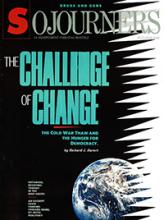Political philosophers tell us that one of the great driving forces of human history is the tension between individualism (or liberty) and community (or equality). As we all know, the American experiment has been mostly one of seeing how far we can push individual liberty without exploding into fragments.
But even America has always required some sort of moral glue. The ethos of the Reagan era was one of unbounded liberty, bordering on the libertine, in matters economic. But it came with a self-correcting complement of lock-step conformity, martial patriotism, and private moralism that gave a sort of transcendence to the orgy of profit-taking. It was a Planet Bizarro anti-version of the 1960s, when a communal devotion to social justice and equality was juxtaposed with private hedonism and anti-nationalism.
But through both of those great watersheds in postwar culture there has really been only one great tie that bound the experience of 200 million-plus citizens into something that could be called "American." That was television.
For a while there, television seemed to resolve the great dialectic. It was the ultimate expression of individualism. It brought the world into our nuclear living rooms. It allowed us to partake of the whole range and variety of human experience without actually having to encounter other humans besides the immediate few of our biological family or self-selected circle of friends. But television also provided, for the first time, a shared American culture that was truly national, cutting across lines of ethnicity, class, region, and time zone.
Read the Full Article

